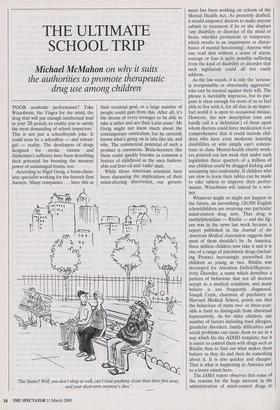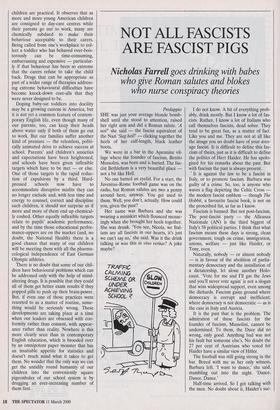THE ULTIMATE SCHOOL TRIP
Michael McMahon on why it suits
the authorities to promote therapeutic drug use among children
`POOR academic performance? Take Wizzobrain, the Viagra for the mind, the drug that will put enough intellectual lead in your 2B pencils to enable you to satisfy the most demanding of school inspectors.' This is not just a schoolboyish joke. It could soon be a schoolboy — and school- girl — reality. The developers of drugs designed for stroke victims and Alzheimer's sufferers have been describing their potential for boosting the memory power of undamaged brains, too.
According to Nigel Greig, a brain-chem- istry specialist working for the biotech firm Axonyx, 'Many companies . . . have this as their eventual goal, as a large number of people could gain from this. After all, it's the dream of every teenager to be able to take a tablet and ace their Latin exam.' Mr Greig might not know much about the contemporary curriculum, but he certainly knows what's going on in labs like his, and why. The commercial potential of such a product is enormous. Brain-boosters like these could quickly become as common a feature of childhood as the once fashion- able cod liver oil and 'radio' malt.
While those American scientists have been discussing the implications of their mind-altering discoveries, our govern- `The Sixties? Well, you don't sleep as well, can't read anything closer than three feet away, and your short-term memory's shot.' ment has been working on reform of the Mental Health Act. As presently drafted, it would empower doctors to make anyone submit to treatment if he or she displays `any disability or disorder of the mind or brain, whether permanent or temporary, which results in an impairment or distur- bance of mental functioning'. Anyone who can read that without a sense of alarm, outrage or fear is quite possibly suffering from the kind of disability or disorder that such legislation could all too easily address.
As the law stands, it is only the 'serious- ly irresponsible or abnormally aggressive' who can be treated against their will. The phrase is inevitably imprecise, but its pur- pose is clear enough for most of us to feel able to live with it, for all that in an imper- fect world it is open to occasional misuse. However, the new description (one can hardly call it a 'definition') of those upon whom doctors could force medication is so comprehensive that it could include chil- dren who have even moderate learning disabilities or who simply can't concen- trate in class. Mental-health charity work- ers pointed out last week that under such legislation three quarters of a million of our children could be drugged kicking and screaming into conformity. If children who are slow to learn their tables can be made to take tablets to improve their perfor- mance, Wizzobrain will indeed be a win- ner.
Whatever might or might not happen in the future, an astonishing 126,500 English schoolchildren are receiving one particular mind-control drug now. That drug is methylphenidate — Ritalin — and the fig- ure was in the news last week because a report published in the Journal of the American Medical Association suggests that most of them shouldn't be. In America, three million children now take it and it is one of a range of psychiatric drugs (includ- ing Prozac) increasingly prescribed for children as young as two. Ritalin was developed for Attention Deficit/Hyperac- tivity Disorder, a name which describes a pattern of behaviour that not all doctors accept as a medical condition, and many believe is too frequently diagnosed. Joseph Coyle, chairman of psychiatry at Harvard Medical School, points out that the behaviour of many two- or three-year- olds is hard to distinguish from abnormal hyperactivity. As for older children, any number of factors including food allergies, glandular disorders, family difficulties and social problems can cause them to act in a way which fits the ADHD template; but it is easier to control them with drugs such as Ritalin than to find out what makes them behave as they do and then do something about it. It is also quicker and cheaper. That is what is happening in America and to a lesser extent here.
The JAMA report observes that some of the reasons for the huge increase in the administration of mind-control drugs to children are practical. It observes that as more and more young American children are consigned to day-care centres while their parents go out to work, many are chemically subdued to make their behaviour acceptable to their carers. Being called from one's workplace to col- lect a toddler who has behaved over-bois- terously can be time-consuming, embarrassing and expensive — particular- ly if that behaviour has been so extreme that the carers refuse to take the child back. Drugs that can be appropriate as part of a wider range of therapies address- ing extreme behavioural difficulties have become knock-down cure-alls that they were never designed to be.
Doping baby-sat toddlers into docility may be a growing custom in America, but it is not yet a common feature of contem- porary English life, even though many of our parents, too, can keep their heads above water only if both of them go out to work. But our families suffer another kind of pressure — the relentless, politi- cally animated drive to achieve success at school. Parents' and children's anxieties and expectations have been heightened, and schools have been given inflexible targets which have to be met — or else. One of those targets is the rapid reduc- tion of expulsions by a third. Hard- pressed schools now have to accommodate disruptive misfits they can no longer exclude and, with less time and energy to counsel, correct and discipline such children, it should not surprise us if more and more of them end up chemical- ly coshed. Other equally inflexible targets relate to pupils' academic performance, and by the time those educational perfor- mance-uppers are on the market (and, no doubt, the National Health) there is a good chance that many of our children will be meeting them with all the pharma- cological independence of East German Olympic athletes.
There is no doubt that some of our chil- dren have behavioural problems which can be addressed only with the help of mind- altering drugs. It is possible that they could all of them get better exam results •if they popped pills to push up their brain-power. But, if even one of those practices were resorted to as a matter of routine, some- thing would be seriously wrong. These developments are taking place at a time when our leaders are obsessed with con- formity rather than consent, with appear- ance rather than reality. Nowhere is this more clearly seen than in contemporary English education, which is brooded over by an omnipotent paper monster that has an insatiable appetite for statistics and doesn't much mind what it takes to get them. No wonder that the only way we can get the untidily round humanity of our children into the conveniently square pigeonholes of our school system is by drugging an ever-increasing number of them first.



































































 Previous page
Previous page